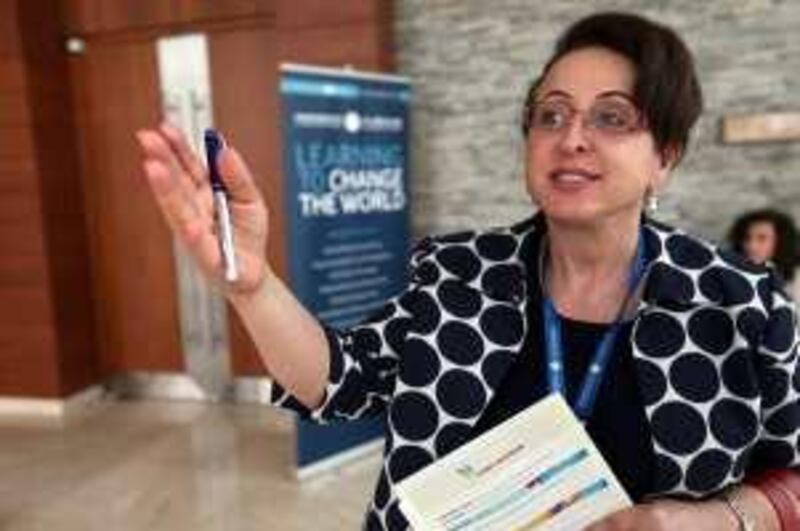ABU DHABI // Women in the science and engineering fields need their own associations to help them once they break into the traditionally male-dominated sectors, experts say. In the US, the foundation of the Arab American Women's Business Council (AAWBC) was formed to meet the growing needs of Arab businesswomen, Jumana Judeh, one of the AAWBC's founders, told a conference in the capital yesterday.
She said they faced challenges, such as family and social pressures, as well as additional ones in the workplace following the September 11, 2001 attacks. "None of the Arab companies were servicing the needs of the Arab women. The Arab American businesswoman is different to the average Arab American woman," she told delegates at the Women in Science and Engineering conference. "They need a moral support network around them."
From as early as university, women in male-dominated sectors need to find mentors. This is where associations can play a vital role, said Ms Judeh, noting they can help provide networking opportunities or other advantages, such as internships. Her association is a case in point. "We've had a massive impact on science and engineering, encouraging the young college student that she can enter any field she wants and she's not alone. She has the support of our members to assist her when she enters male- dominated fields to mentor her through."
The struggle for girls in the UAE is "much harder" than that of the Arab American, said Ms Judeh, a Palestinian who moved to the US in 1970. "The Arab girl wants to be a good daughter, mother, wife, but she has to be true to herself and fulfil her own needs or else it impacts on every other aspect of her life. It's about opening the little doors, so she will show she can always stay true to her family ties," she said."
More than 200 leading women scientists, academics, industry researchers and government officials, many from the Middle East and North Africa region, including Sheikha Lubna Al Qasimi, the Minister of Foreign Trade, are attending the two-day conference, which finishes today. Dr Sultan Ahmed al Jaber, Masdar's chief executive, told the conference: "As leaders and critical thinkers, undoubtedly, women scientists and engineers across the Mena region have a fundamental role to play."
The conference, at the Yas Island Rotana, has been organised by Masdar and the US State Department. The UAE is on course to have 40 per cent of its science and engineering jobs filled by women, a bigger proportion than in the US. Currently, the UAE's figure stands at about 25 per, compared to between 15 and 20 per cent in the US but with rising numbers of engineering students across the country, this is expected to eventually reflect in the workplace.
The biggest challenge to increasing the presence of women in the field, continues to be retention, according to Dr Nadia al Hasani, head of the women's campus at the Petroleum Institute in Abu Dhabi, whose students all go on to work for Adnoc, the national oil company. She asked what employers are doing to ensure women stay in their jobs. "What people don't realise is that the affinity group is about retention, not equal pay or equal rights," she said. "It's not some kind of women's liberation. The major issue is retention.
"Seventy-seven per cent of the college graduates here are women, the highest in the world according to the United Nations, but where are they? "How can we be sure that in the near future, in three or five years time, that our efforts in educating these girls won't be wasted? "With our students, it is key to keep them in their first year but employers need to keep their end of the bargain." mswan@thenational.ae






